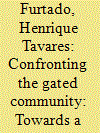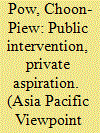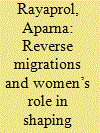| Srl | Item |
| 1 |
ID:
183703


|
|
|
|
|
| Summary/Abstract |
This article investigates the works of Dussel, Maldonado-Torres, and Mbembe as representatives of a tendency in the field of decolonial thought to assume the templates of warfare and the camp as the archetypal registers of violence in the contemporary world. Identifying this focus as the remnant of a Eurocentric vocabulary (the paradigm of war), the article proposes a shift from the language of warfare predominant in the field to a language of welfare. The article turns to the gated community (GC), instead of the camp, and the imperatives of (re)creation, instead of the logics of elimination, as new templates with which to make sense of modern/colonial violence. Moving beyond militaristic imagery, the analysis shows a form of violence that emerges as a response to the endless search for a life of convenience inside the walls of the GC. To this end, the article advances the concept of the dialect of disarrangement, the enforced but uneasy encounter between two subjectivities that inhabit the GC: the patrons (the homeowners who consume the easy life) and servants (the racialised service staff). In the GC, violence emerges in attempts to respond to this (in)convenient encounter via misrepresentations of both patrons and servants as out of their place.
|
|
|
|
|
|
|
|
|
|
|
|
|
|
|
|
| 2 |
ID:
090020


|
|
|
|
|
| Publication |
2009.
|
| Summary/Abstract |
While the proliferation of gated communities worldwide has generated great interests and debates, the emergence of gated communities is by no means a 'global' urban phenomenon that displays uniform characteristics and genesis. Drawing on Singapore as a case study, this paper goes beyond the universalising and often polemical discourses on gated communities to provide a balanced account on how gated communities in the form of enclosed condominium estates are locally embedded in the city state where public housing dominates. As will be pointed out in the paper, gated communities in Singapore may be considered as a form of 'club good' that exists as part of the state's urban/national developmental agenda and are, arguably, less socially and spatially divisive than those depicted elsewhere. By teasing out the local specificities of gated communities, this paper underscores the need to read beyond the physical form of gated communities in order to understand the complex social and political production of housing landscapes.
|
|
|
|
|
|
|
|
|
|
|
|
|
|
|
|
| 3 |
ID:
136298


|
|
|
|
|
| Summary/Abstract |
This article considers the way in which the ‘microphysics of power’ works on space and impacts on spatial politics. I focus on the transformation of one cantonment from a military garrison into a ‘residential barrack’: the Malir Cantonment in Karachi, Pakistan. The paper begins by tracing the history of cantonments, before locating the Malir Cantonment in the changing political, economic, and demographic dynamics of Karachi. Through this, the article focuses on the mechanisms through which Malir Cantonment functions as a residential barrack.
|
|
|
|
|
|
|
|
|
|
|
|
|
|
|
|
| 4 |
ID:
180275


|
|
|
|
|
| Summary/Abstract |
The paper is based on ethnographic observations of religious practices among Muslim return migrants from the Gulf, and among Hindu return migrants from the United States. The goal of these observations was to understand the ways that diasporic cultures have transformed these migrants’ religious practices after they return to India. We focus on the city of Hyderabad, in South India, with its long history of diverse Muslim communities, and recent histories of migration and reverse migration to the Gulf region in Western Asia, as well as recent transformations through the growth of gated communities that have attracted Hindu reverse migrants from the United States. We focus on women’s engagement with religious cultural practices and the ways in which religion and gender are restructured through the process of migration and reverse migration.
|
|
|
|
|
|
|
|
|
|
|
|
|
|
|
|